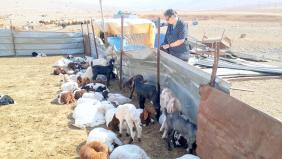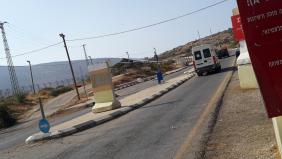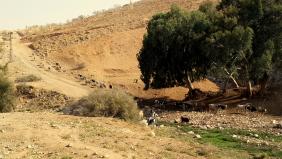Tayasir, Mon 11.11.13, Morning
11:30 Haleth Makhu - After visiting the A. family’s encampment, whose handicapped daughter we’re trying to help, we drove with her father to see what was happening at Haleth Makhul. The place seems to have become a pilgrimage site. Members of some European organization were also there; they’d come in a jitney and had themselves photographed with one of the locals as a souvenir before leaving. The rubble from the demolition is still visible but it’s been collected into piles; small and large structures are scattered among it, some covered with good quality plastic sheeting. The local resident again recounted the destruction caused by the army’s bulldozers and hoped that Jibran, the attorney from Umm el-Fahm, will be able to deal with the Israeli court system’s red tape and regain the residents’ right to live there. Meanwhile Neta discovered a bustling, bleating kindergarten – a pen of cute baby
After visiting the A. family’s encampment, whose handicapped daughter we’re trying to help, we drove with her father to see what was happening at Haleth Makhul. The place seems to have become a pilgrimage site. Members of some European organization were also there; they’d come in a jitney and had themselves photographed with one of the locals as a souvenir before leaving. The rubble from the demolition is still visible but it’s been collected into piles; small and large structures are scattered among it, some covered with good quality plastic sheeting. The local resident again recounted the destruction caused by the army’s bulldozers and hoped that Jibran, the attorney from Umm el-Fahm, will be able to deal with the Israeli court system’s red tape and regain the residents’ right to live there. Meanwhile Neta discovered a bustling, bleating kindergarten – a pen of cute baby goats, white, brown, black, spotted – an optimistic sight in this mild, sunny midday weather.
goats, white, brown, black, spotted – an optimistic sight in this mild, sunny midday weather.
12:40 Tayasir checkpoint. We stood beside the concrete barrier marking the entrance to the checkpoint, observing what was going  on. The checkpoint wasn’t operating at that moment. Soon an army vehicle arrived and stopped determinedly right next to us. An agitated soldier got out, announced this was a “closed” “military” area, and we’re absolutely “prohibited” from being here. God knows how many such discussions we’ve had during our ten years at the checkpoints on the West Bank and the Jordan Valley with soldiers who were under the misapprehension that they’re the law and the law is them, and they have the authority to close the crossing to whomever they wish, including members of human rights organization who came to observe and not interfere with the checkpoint’s operation. We tried to deal seriously with the soldier’s baseless statements and conduct a useful conversation despite his belligerent tone. But it
on. The checkpoint wasn’t operating at that moment. Soon an army vehicle arrived and stopped determinedly right next to us. An agitated soldier got out, announced this was a “closed” “military” area, and we’re absolutely “prohibited” from being here. God knows how many such discussions we’ve had during our ten years at the checkpoints on the West Bank and the Jordan Valley with soldiers who were under the misapprehension that they’re the law and the law is them, and they have the authority to close the crossing to whomever they wish, including members of human rights organization who came to observe and not interfere with the checkpoint’s operation. We tried to deal seriously with the soldier’s baseless statements and conduct a useful conversation despite his belligerent tone. But it  seemed that he and his comrades in the jeep weren’t willing to forgo the action, one-sided though it was. “I know who you are and why you’re here and what you want to do here, and if you don’t leave RIGHT NOW I’ll close the checkpoint and no one will go through, no one.” I should note we were wearing no badges and had no banner by which he could identify us – only some gray hair. The possibility of first asking us politely who we were didn’t occur to him. While he was telling us what to do a Palestinian ambulance arrived from the Jordan Valley on its way to the West Bank, and a minibus taxi carrying passengers came from the other direction. All the participants in this checkpoint game know that the threat to shut it down is the winning card, so we played our part and left with heads held high. We’ll submit a formal complaint.
seemed that he and his comrades in the jeep weren’t willing to forgo the action, one-sided though it was. “I know who you are and why you’re here and what you want to do here, and if you don’t leave RIGHT NOW I’ll close the checkpoint and no one will go through, no one.” I should note we were wearing no badges and had no banner by which he could identify us – only some gray hair. The possibility of first asking us politely who we were didn’t occur to him. While he was telling us what to do a Palestinian ambulance arrived from the Jordan Valley on its way to the West Bank, and a minibus taxi carrying passengers came from the other direction. All the participants in this checkpoint game know that the threat to shut it down is the winning card, so we played our part and left with heads held high. We’ll submit a formal complaint.
On our way home we passed an impressively large herd of cattle. We stopped to photograph; the curious Palestinian herders galloped toward us. After an exchange of polite greetings, and offering them some treats we happened to have with us, they asked who we were. Friends of Dafna, we said, and were showered with good wishes and respect.
